Delta-8 THC vs. Delta-9 THC: What’s the Difference?
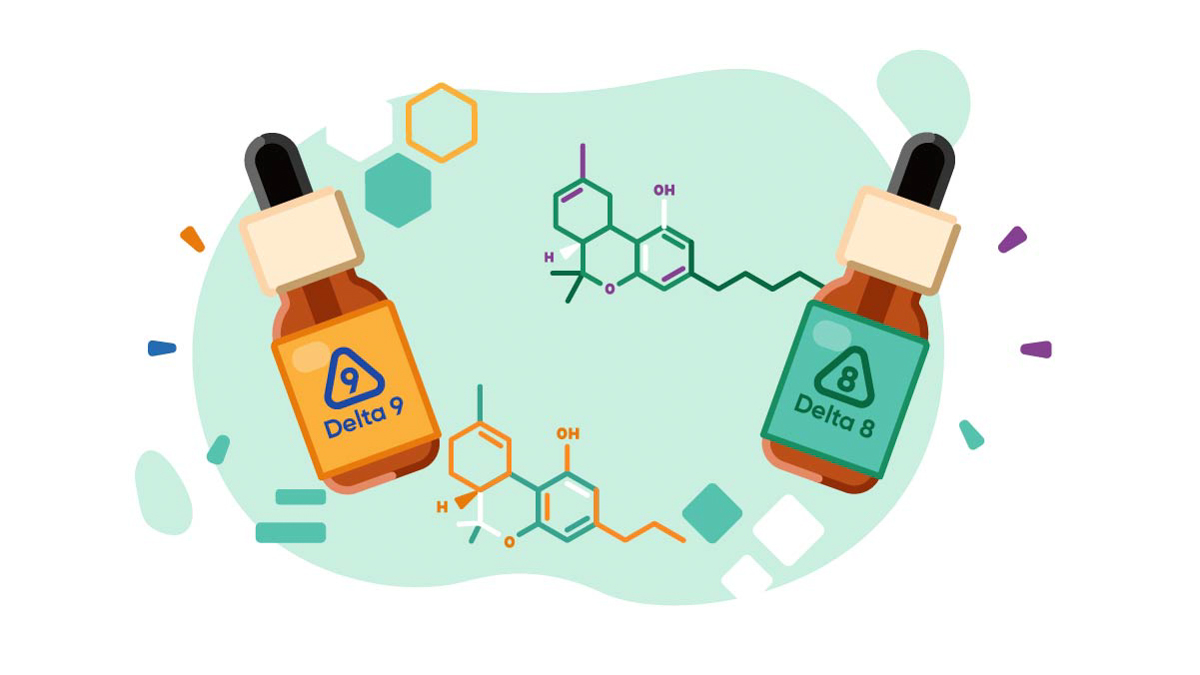
This is a complete rundown of the differences between delta-8 THC and delta-9 THC. You’ll learn about the effects and benefits of each cannabinoid, its safety profile, potential risks, product types, and legality. We also answer the most frequently asked questions on delta-8 and delta-9.
Cannabis users in states where recreational marijuana is legal can enjoy an abundance of products, from delta-9 THC to delta-8 THC to marijuana-derived CBD oils with different ratios between these cannabinoids.
However, if you don’t live in one of those 18 states, you may have a hard time finding high-quality cannabis, not to mention potential penalties for possession.
That’s where hemp-derived delta-8 THC comes into play.
The 2018 Farm Bill legalized all hemp-derived products, which coincided with extraction breakthroughs in the cannabinoid industry.
The new law included isomers of THC as long as the delta-9 THC content is below 0.3%.
This article explains the differences between delta-8 THC and delta-9 THC, from their sources to uses, benefits, side effects, legality — and where to buy the best hemp-derived products online.
Delta-8 THC vs. Delta-9 THC (Summary)
- Delta-8 and delta-9 THC are different versions of the THC molecule. Although they share a similar formula, their chemical structure is slightly different.
- Delta-8 THC is about half as potent as delta-9. You’d need to consume twice the amount of delta-8 to experience the same type of high as with marijuana.
- Unlike delta-9, delta-8 THC is federally legal as long as it comes from hemp. However, 14 states have banned delta-8 products, imposing the 0.3% limit on all THC variants.
- Delta-8 THC has a lower incidence of anxiety and paranoia than delta-9. Most users report feeling relaxed, relieved from stress, and experiencing a boost of creativity. However, you should always use such products responsibly.
- Look for batch-specific certificates of analysis (CoA) when buying hemp-derived delta-8 THC products. The CoA should list the results for potency and common contaminants, such as pesticides, heavy metals, solvents, and mold.
What is Delta-8 THC?
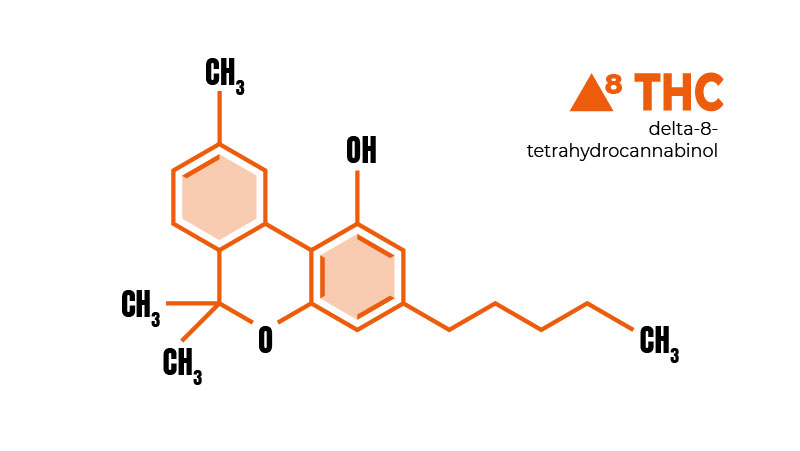
Cannabis plants contain only a trace amount of delta-8 THC. It’s typically extracted in usable amounts from hemp-derived CBD. This is achieved by adding specialized catalysts to the extraction process to convert CBD into delta-8 tetrahydrocannabinol (Delta-8 THC).
While CBD is not intoxicating, delta-8 THC can get you high in a similar way to delta-9 THC — but without edgy stimulation in high doses.
Delta-8 THC products come in many forms, including tinctures, gummies, pre-rolls, and vape cartridges.
Some manufacturers claim that delta-8 products can be useful for a range of health conditions. However, the Food and Drugs Administration (FDA) hasn’t evaluated those statements. In fact, the FDA issued warning letters in May 2022 to five companies making delta-8 THC products for breaching the provisions of the Federal Food, Drug, and Cosmetic Act.
Benefits
Since delta-8 THC is the isomer of delta-9, they come with similar effects and health benefits. While the science isn’t settled when it comes to the approved medicinal uses of cannabis, the plant has great potential to alleviate many pesky symptoms and regulate the master regulatory network in all humans — the endocannabinoid system (ECS).
The risks and benefits of delta-8 THC depend on the total chemical content of the product, the dose consumed, the method of administration, the user’s tolerance, and demographics and overall health status of a person consuming.
The potential benefits of delta-8 THC include:
- Elevated mood
- Pain relief
- Improved appetite
- Better sleep quality
- Reduced inflammation
- Neuroprotection
- Cognitive boost
Risks & Side Effects
As with any substance, consuming more delta-8 THC than the body can handle can cause short-term side effects. These negative reactions depend on the dosage; the more you take, the higher the risk.
Common side effects of delta-8 THC include:
- Dry mouth and red eyes
- Increased heart rate
- Disorientation
- Dizziness
- Impaired coordination
- Anxiety and paranoia (rare)
They should resolve within a few hours when you inhale delta-8 THC. The effects of delta-8 edibles will last longer, so take even greater caution when dosing those infused gummies.
Additionally, taking a large dose of delta-8 THC may be detrimental to heart health and cause abnormal heart rhythms in those with underlying cardiovascular conditions.
There’s also the risk of contamination in untested delta-8 products. According to the FDA, some delta-8 extracts may contain harmful additives or be contaminated with pesticides, heavy metals, or solvents.
What is Delta-9 THC?
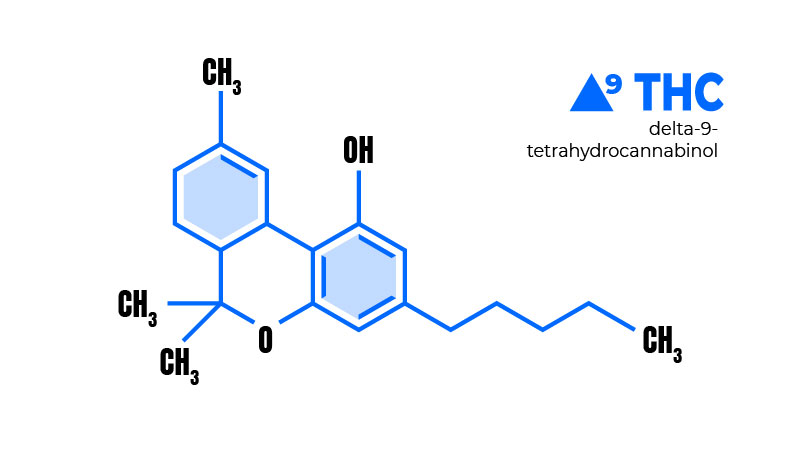
Delta-9 THC is the primary naturally-occurring psychoactive component of cannabis. When you consume marijuana, it’s the delta-9 that gets you high and creates a palette of euphoric effects.
In states where high-THC cannabis is legal for recreational or medical use, you can find a broad range of delta-9 products, including flowers, cookies, candies, beverages, vape pens, topicals, and transdermal patches.
Although the FDA has approved only synthetic THC medications — dronabinol and nabilone, which are used to reduce the side effects of chemotherapy — many manufacturers market delta-9 THC products as medicinally beneficial, with significant support from doctors specializing in cannabis treatments.
Benefits
Potential health benefits of delta-9 THC include:
- Deep relaxation
- Increased appetite
- Elevated mood
- Reduced stress
- Decreased anxiety
- Feelings of happiness and euphoria
- Heightened creativity
- Improved sensory perception
- Pain relief
- Better sleep
Studies show medical cannabis has the potential to treat certain medical conditions, such as nausea, vomiting, chronic pain, muscle spasticity, insomnia, gastrointestinal disorders, autoimmune diseases, and dementia.
Mental conditions that could be improved with medical marijuana use include anxiety disorders, depression, post-traumatic stress disorders, and autism.
Risks & Side Effects
Similar to delta-8 THC, the side effects of delta-9 depend on the amount consumed, the user’s sensitivity to THC, tolerance, consumption method, and product type.
If you take too much delta-9 THC, you can experience
- Dry mouth
- Red eyes
- Heightened anxiety
- Paranoia
- Confusion
- Dysphoria (feelings of unease)
- Low blood pressure (hypotension)
Heavy cannabis users who smoke large amounts of weed or consume concentrates may suffer from cannabinoid hyperemesis syndrome, which involves severe nausea, vomiting, dehydration, and abdominal pain.
Several studies have also found a link between chronic cannabis use and increased risk of psychosis and schizophrenia in adolescents with genetic burdens. However, current studies have failed to identify causality in this case, so more research is needed until we know the final answer.
Delta-8 THC vs. Delta-9 THC: Similarities
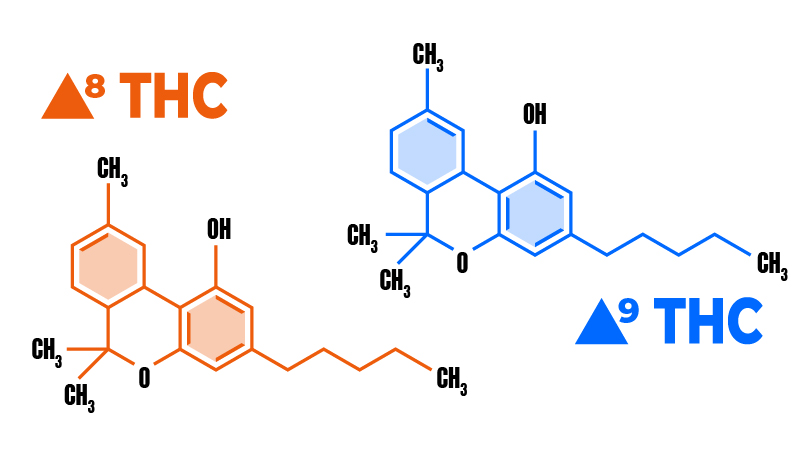
Both delta-8 and delta-9 THC are members of the tetrahydrocannabinols family. They activate the body’s CB1 and CB2 receptors, causing a range of physiological and psychological reactions.
Their interaction with CB1 receptors is responsible for relaxation, appetite boost, nerve regeneration, stress relief, and euphoria.
CB2 receptors are primarily associated with the anti-inflammatory and immunomodulatory effects of cannabis because their activation helps reduce inflammation and improve communication between immune cells.
But there are more differences than similarities in this duo.
Delta-8 THC vs. Delta-9 THC: What Are the Main Differences?
Delta-9 THC has been thoroughly studied for nearly 60 years, while research on delta-8 THC is in its infancy — that’s the first difference.
However, there’s more to it than meets the eye.
Here’s what you need to know about the main differences between delta-8 THC and delta-9 THC.
Source
Delta-9 THC is found in significant concentrations in marijuana plants. Marijuana is every cannabis plant that contains more than 0.3% THC on a dry-weight basis.
There’s not much delta-8 THC in marijuana, though. It forms as a byproduct of THC’s degradation over time, but it still constitutes a sad minority — most of the THC content degrades into CBN.
Most delta-8 THC products available on the market come from hemp plants.
But hemp plants contain only 1% delta-8 on average, so in what way is hemp a better source than marijuana?
Here’s the answer.
Extraction
Delta-9 THC is extracted directly from marijuana. Manufacturers produce delta-9 extracts by treating the plant material with a solvent, such as ethanol, butane, cooking fats, or CO2.
Depending on the solvent or extraction methods, the end product may contain anywhere from 5% to 90% THC.
You can also find delta-9 THC in dried and cured marijuana flowers.
Delta-8 THC requires a complex conversion process that uses specialized catalysts to convert CBD into delta-8.
As a result, most delta-8 THC products contain 0.3% delta-9 THC or less.
Legal Status
Delta-9 THC is federally illegal because it is a Schedule I controlled substance. However, individual states can decide to regulate certain chemicals on their own. So far, 18 states have legalized marijuana for recreational use, allowing adults to legally consume delta-9 products.
With delta-8 THC, it’s a different story. Hemp-derived delta-8 THC is federally legal as long as its delta-9 THC content doesn’t breach the federal limit.
14 states have banned delta 8 THC by imposing the same 0.3% limit on all tetrahydrocannabinols.
Effects
The effects of delta-8 and delta-9 THC are similar on the surface. However, delta-9 THC is more psychedelic and stimulating than its isomer.
The high from delta-8 THC is smoother and less likely to make you anxious or paranoid. Other side effects, such as brain fog, confusion, and dizziness, are also less frequent.
Instead, you simply feel more relaxed and stress-free.
The onset is also more rapid and intense with delta-9 THC; the effects of delta-9 develop gradually, leading to a more mellow buzz.
Safety
The World Health Organization acknowledges cannabis as a “relatively safe substance” with clinically insignificant side effects.
Delta-8 THC isn’t as well-researched as delta-9 THC, but since it packs less punch, it’s within reason to assume that it has a better safety profile than its stronger cousin.
Potency
Delta-8 THC has a slightly different chemical structure than delta-9 THC. It has a double bond at the eighth carbon chain, while delta-9 has this bond at the ninth chain.
This subtle difference makes delta-8 THC about 50% less potent than delta-9.
You’d need to take twice the amount of delta-8 to experience the same intensity of high as with marijuana.
Products
The most popular delta-9 THC product is… marijuana flowers. Dried buds are everywhere and can get you from 5% to a whopping 35% of delta-9.
Other forms of delta-9 include tinctures, edibles, capsules, vape pens, concentrates, pre-rolled joints, topicals, and transdermal patches.
Delta-8 THC has a flower form, but it’s actually not a natural delta-8 flower. These are hemp CBD buds sprayed with delta 8 THC distillate for increased potency. The psychoactive effects of delta-8 flowers are balanced with CBD and ensure a smoother experience.
You can also find delta-8 THC in tinctures, edibles, vape carts, pre-rolls, and pure distillate.
Availability
The unintentional loophole created by the 2018 Farm Bill resulted in the emergence of a booming market. Delta-8 THC products are literally everywhere, and although the product range is less diverse than with delta-9 THC, they’re more available due to their legal status.
You can legally buy hemp-derived delta-8 THC in 36 states, while only 18 states have a legal market for recreational cannabis users.
Dosage
A typical psychoactive dose of delta-9 THC is 5 or 10 milligrams. Anything below is closer to microdosing and won’t get you high.
A moderate dose ranges between 15 and 30 milligrams. Taking more than that can be highly intoxicating if this is your first time with cannabis.
Of course, there are people who can tolerate dosages like 100 mg, but these are seasoned users or patients with a high tolerance.
On the other hand, the psychoactive dose of delta-8 THC is around 15 mg. Doses like 25 mg or 50 mg are considered moderate, and anything above that figure can produce a strong high.
Using both cannabinoids responsibly and in moderation is the best way to avoid their side effects.
Best Delta-8 THC Products
No two delta-8 THC products are the same. The hemp market is still largely unregulated, making delta-8 subject to no manufacturing, testing, and labeling standards.
Choosing a high-quality d8-infused product requires a serious amount of research and good knowledge of cannabinoids and terpenes.
If you’re in a rush, I recommend checking out delta-8 extracts from two brands that, in my opinion, offer the best value for money in 2022.
Area 52
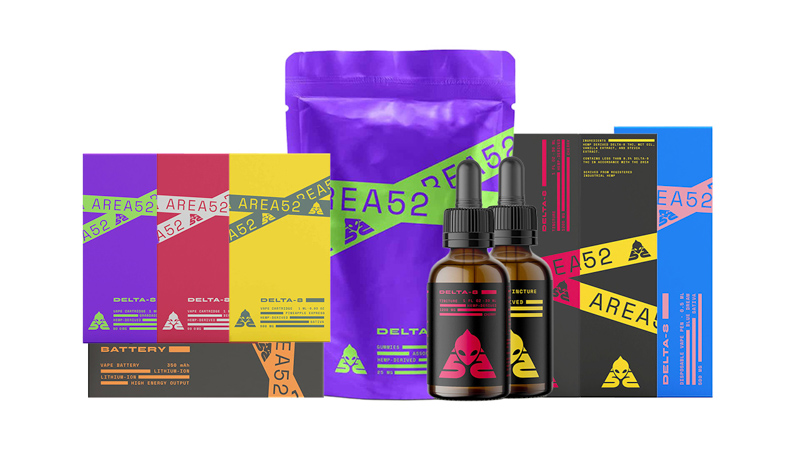
Area 52 is a California-based company specializing in novel cannabinoids, such as delta-8 THC, HHC, CBG, and CBN.
The guys at Area 52 started with a humble selection of premium delta-8 distillates, slowly but surely expanding its line-up with new formats.
Today, Ara52 offers products like tinctures, gummies, vape carts, and pre-rolls — all made from organic hemp and triple-tested in an independent, ISO-certified laboratory for potency and purity.
The products from Area52 are quite potent. For example, the delta-8 THC tincture contains 1200 mg of delta-8 per bottle, and the gummies pack 25 mg per serving.
Area52 has recently introduced a new line of “true full-spectrum products,” including unique cannabinoid blends with CBG, CBN, CBD, and delta-9 THC.
Finest Labs
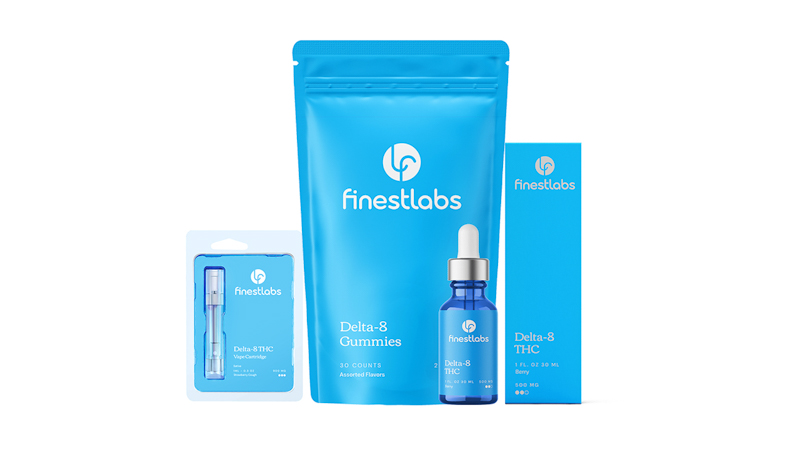
Finest Labs is another brand from California that takes a scientific, no-BS approach to cannabinoids.
The product selection is less impressive than that of Area52, but Finest Labs focuses on mastering their basic formulas before they come up with anything new. You can currently choose three product types: tinctures, gummies, and vape carts. The latest additions to the Finest Labs line-up are HHC gummies and Energy gummies featuring an extra dose of CBG and Vitamin B12.
The company is one of the most reputable manufacturers of plant-derived terpenes. You can use them to create your own cannabis extracts or enhance the desired effects of your favorite products.
Similar to Area 52
FAQs
Is delta-9 stronger than delta-8 THC?
Yes, delta-9 THC is twice as potent as delta-8 THC. If you’ve never tried psychoactive cannabinoids, it’s better to start with a broad-spectrum delta-8 THC product.
Is hemp-derived delta-9 THC legal?
Yes and no.
Delta-9 THC is considered a controlled substance, but hemp-derived products with less than 0.3% delta-9 THC per dry weight are federally legal.
Theoretically, you can have a product with enough THC and moisture to still make it under the 0.3% threshold and end up with more delta-9 than most hemp products.
What kicks in faster: delta-8 or delta-9 THC?
Delta-9 THC has a faster onset than delta-8 THC. The effects are more instantaneous, and you can pick up the strength right after they hit you for the first time.
The effects of delta-8 THC kick in with a slight delay. For example, marijuana tinctures can get you high after 15-20 minutes; for delta-8 tinctures, it can take about 45 minutes until you feel the difference.
Can delta-8 THC show up on a drug test?
Yes, delta-8 THC can theoretically make you fail a drug test. Workplace drug tests are interested in one compound — THC-COOH, which is the metabolite of all THC variants.
If you consume enough delta-8 THC for a long period, it can produce a false-positive result for THC.
The best way to make sure delta-8 THC doesn’t show up on a drug test is to abstain from it for a few weeks before the test.
Can you drive a car after taking delta-8 THC?
No, delta-8 THC is a mild intoxicant and can impair your motor coordination. You should never drive a vehicle or operate heavy machinery after taking delta-8 THC, delta-9 THC, or any other psychoactive substance.
Does delta-8 THC give you anxiety?
Some people believe delta-8 THC can’t give them anxiety, but that’s not true. If you take more than your CB1 receptors can tolerate, the high dose of delta-8 will activate the amygdala — the brain’s region responsible for processing fear.
Although anxiety and paranoia episodes are relatively rare when compared to delta-9 THC, they should always be included when you weigh the benefits and risks.
Delta-8 THC vs. Delta-9 THC: Which Cannabinoid Should You Choose?
Choosing between delta-8 THC and delta-9 THC boils down to how you respond to the cannabis high — and what kind of effects you’re interested in.
If you’re up for a more psychedelic experience marked by euphoria, laughter, heightened imagination, creativity, and the feast of your life, then delta-9 THC sounds like a better choice.
But if you don’t handle high doses of delta-9 THC well and you’re looking for a more mellow, clear-headed buzz, then you should lean towards delta-8 THC.
For someone who lives in a state where marijuana remains illegal for recreational use, hemp-derived delta-8 THC products are the only safe alternative.
When shopping for delta-8 THC products, check your vendor’s reputation and always ask for a relevant certificate of analysis for the batch you’re looking at.